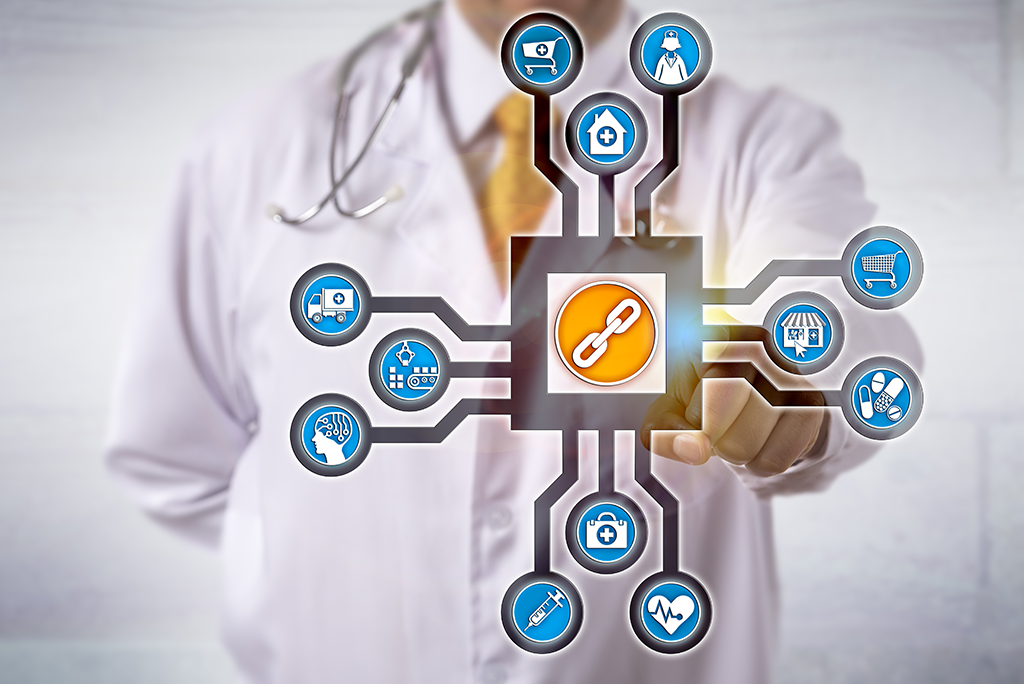Blockchain is a system that creates and stores data without a central hub. When one device on a blockchain makes a transaction, all the other devices make blocks that are the same and show what happened. In the same way, when data in the blockchain is changed in any way, a block is made to record the change so that it can be easily checked and traced back to its source.
How can healthcare use blockchain? The blockchain development services use advanced cryptography to improve the security of data. With blockchain’s permission system, people own their own data again, and its transparency makes clinical trials easier by making sure all the details are written down and stamped with the time.
Real Use Cases of Blockchain in Healthcare:
Here are seven of the most important ways healthcare is using blockchain technology:
Blockchain makes the supply chain for healthcare more transparent.
Counterfeit drugs are a persistent problem. The World Health Organization (WHO) says that as many as 1% of the medicines you can buy in developed countries are fake. This number goes up to almost 10% in developing countries. In 2021, the Drug Enforcement Administration (DEA) caught more than 9.5 million fake medicines in the US, which shows that this is true. The agency says that this number is more than what it was in the two years before.
One way that blockchain is used in healthcare is to make sure that products are real by letting customers track them from the time they are made to the time they are shipped. This is very important for both medicines and medical tools. Once a ledger for a drug is made, it keeps track of where it came from, like a lab. Since then, every change that has been made to this drug is written down. Blockchain can store a lot of information, like how much labor cost and how much waste was made during production and shipping.
MediLedger is an example of a blockchain protocol that can be used by healthcare organizations to check information about the supply chain of prescription drugs. This includes things like when they go bad, who made them, etc. MediLedger also lets people send each other secure messages between peers. This network is used by many big names in health care, like Bayer, Pfizer, and Cardinal Health.
In another case, Blockpharma, a company based in Paris, made a solution that scans the supply chain of medicines and verifies it at all points of shipment. The company’s app lets patients check that what they bought is real. Blockpharma is thought to stop 15% of all fake drugs around the world.
Blockchain makes it faster to get medical credentials
Verifying credentials like training, skills, medical licenses, and education is a tedious process that is usually done by phone and email and can take up to four or even six months to finish. According to the Council for Affordable Quality Healthcare, payers spend almost $2 billion each year to keep a complete database of healthcare providers. Blockchain technology can provide an alternative that is faster and more reliable and doesn’t rely on direct human references.
Blockchain lets healthcare organizations record and keep track of their staff’s credentials. This arrangement speeds up the hiring process and makes it easier for subcontractors, hospitals, and patients to see each other’s work and trust each other. Also, blockchain records can be updated in small steps when professionals need to add credentials.
ArchiveCore is a new company in the healthcare credentialing field that was started by two doctors. It uses blockchain to verify primary source credentialing documents in order to speed up background checks for new hires. When Carilion Clinic compared the ArchiveCore software to the way they usually hire 17 employees, they were shocked to find that they could have saved $1.2 million in lost revenue.
Blockchain enables patient-centric EHRs
Sharing medical information is a sensitive task that is governed by a lot of rules. A survey of doctors and nurses in the US shows that 74% of the people who took part think that sharing health information between different departments puts patients’ safety at risk.
One of the most common ways blockchain is used in healthcare is to give a full view of a patient’s records and manage permissions for data sharing. Patients have full control over their records with these kinds of systems. They are notified when their information changes, and they can share their full or partial records with doctors, researchers, and other people. Patients can even set a time limit on how long a third party can see their records. With this system, insurance companies can get confirmations from patients directly, without going through a third party.
MedicalChain is one place where the technology is used. This company helps doctors and hospitals connect their electronic medical records to a platform that is powered by blockchain. MedicalChain software can be used to make other healthcare solutions, like virtual consultations and marketplaces where patients can sell their anonymized medical data.
Blockchain makes clinical trials easier
ClinicalTrials.gov shows that making new drugs costs about $350 billion around the world every year. Clinical trials gather a lot of information and involve a lot of people, like sponsors, study participants, doctors, researchers, drug makers, and so on. So, it is easy to make mistakes, and it is possible to lie on purpose. Another problem is finding and getting people to join. A new study shows that only 8% of people with cancer took part in clinical trials. Also, information about trails is usually kept in centralised databases, which makes it hard for everyone to share.
One way that blockchain can be used in healthcare is to make clinical trials more open. This lets researchers find studies with questionable protocols and stop them from being published. With this technology, all documents for clinical trials can be stamped with the time and kept in a safe place. Documents like project proposals, surveys, research designs, blood tests, patient consent forms, and so on are all kept in the blockchain. This technology also lets people in different parts of the world see the same data at the same time, which is important for making decisions about trials.
Blockchain can also help manage the money for clinical trials. For example, Boehringer Ingelheim, a German pharmaceutical company, worked with IBM to use a blockchain-based accounting system for its clinical trials. One problem is that people who take part in trials don’t get paid on time. Most of the time, it takes several months for these people to get paid. Bloqcube specializes in blockchain-powered clinical trial software, and it thinks that working with central bank digital currencies can speed up the payment process so much that doctors and patients can get paid just a few minutes after completing a task.
Blockchain makes things safer
Most health information is kept in centralised databases that can’t protect it well enough from theft and breaches. HIPAA Journal says that in 2021, there were 686 healthcare data breaches that exposed a total of 44,993,618 medical records.
Blockchain can make it easier to store and share health data in a safe way. For example, Akiri is a network-as-a-service company based in California that uses blockchain to offer a set of policies, configure data layers, and verify the source and destination of health data in real time.
Also Read Here: Exploring Green Blockchain For A Sustainable Future
There is also encryption on the blockchain. If a healthcare provider wants to look at information about a patient, they will need the public key. 63% of healthcare organizations don’t encrypt the protected health information (PHI) on their workstations, according to research. Testd, a big platform in the US for verifying test results and vaccines, uses blockchain to encrypt and hide its data.
Supporting wearable medical devices is another way that blockchain can be used in healthcare to improve security. This technology makes it easier for devices to record and send IoT data to healthcare providers in a safe way. It can stop unauthorized changes to the data, block access to certain devices, and shut down nodes that have been hacked.
Smart contracts help blockchain keep promises.
Every industry has problems with disagreements over contracts and with people not keeping their end of the deal. Research shows that 10% of insurance claims in the medical field are disputed, while 17% of claims are denied for things like not having enough information, making duplicate claims, not registering properly, etc.
Blockchain enables use of smart contracts
A piece of code that is put on a blockchain is a smart contract. It is set up to run on its own when certain conditions are met. By getting rid of middlemen, smart contracts help the medical field cut costs.
Different people involved in healthcare, like doctors, patients, insurers, and medical device makers, can use this technology to verify their identities on the network and record the terms of their contracts. This will happen automatically and will be clear to everyone involved. For example, when a patient goes to the doctor, the blockchain ledger will record this and notify the insurance company. Stakeholders can use smart contracts to check facts and settle disagreements more quickly.
Curisium, which was recently bought by Philadelphia-based HealthVerity, made a blockchain-based platform that helps the healthcare industry manage and negotiate contracts. It lets both providers and payers take part in new, secure contracting arrangements and find common ground if a dispute arises.
Genomic research is made possible by Blockchain
The price of genomic sequencing has dropped sharply in the past few years, from $10,000 to $1,000, and some companies say they can do it for only $100. This makes scientists more likely to do research on the genome. But where to find people who are willing to help? And how do you store such huge amounts of data in a safe way?
Here’s another way healthcare can use blockchain. With this technology, people can store billions of genome data points, send them securely to other people who are interested, and prove ownership. The technology also helps people legally sell their genetic information without going through middlemen.
In conclusion
As we’ve already talked about, blockchains are now an important part of the healthcare industry. From hospitals to the pharmaceutical and medical industries, they are used to make solutions that are small and safe. As more and more people in the healthcare field learn about healthcare blockchains, their uses are likely to become more common in the years to come.




